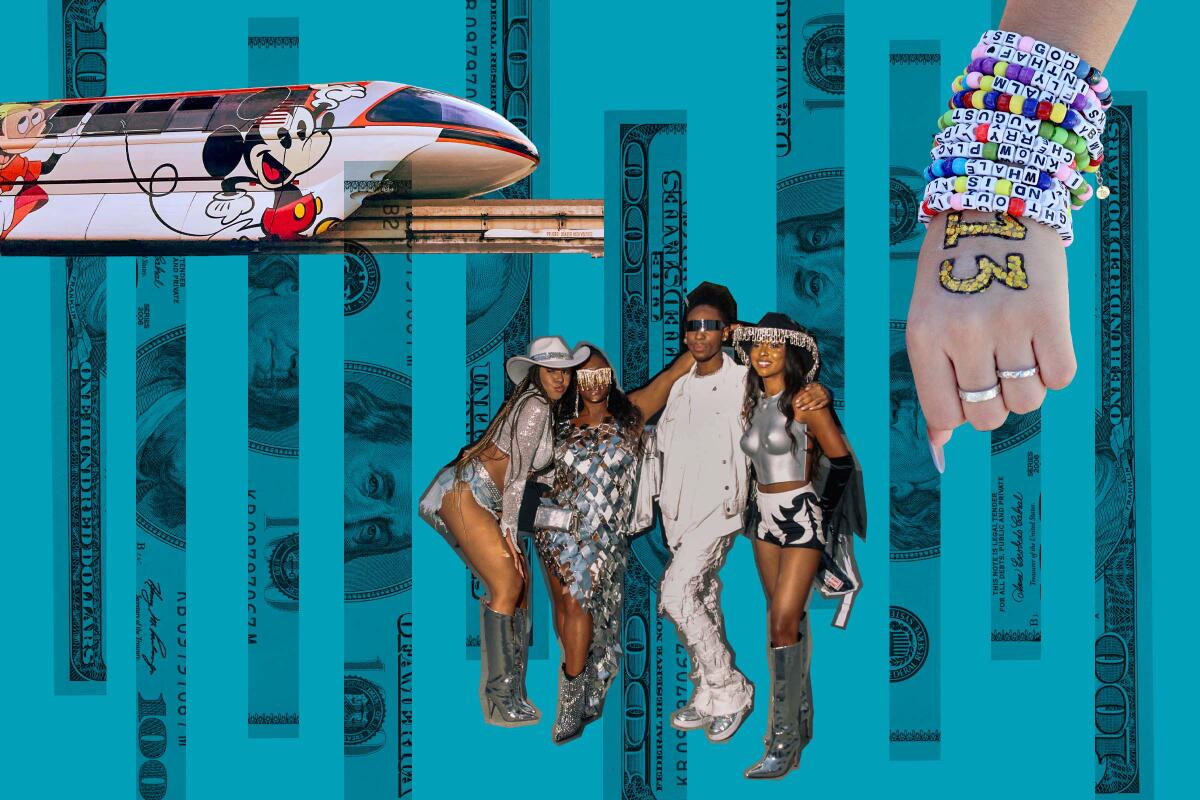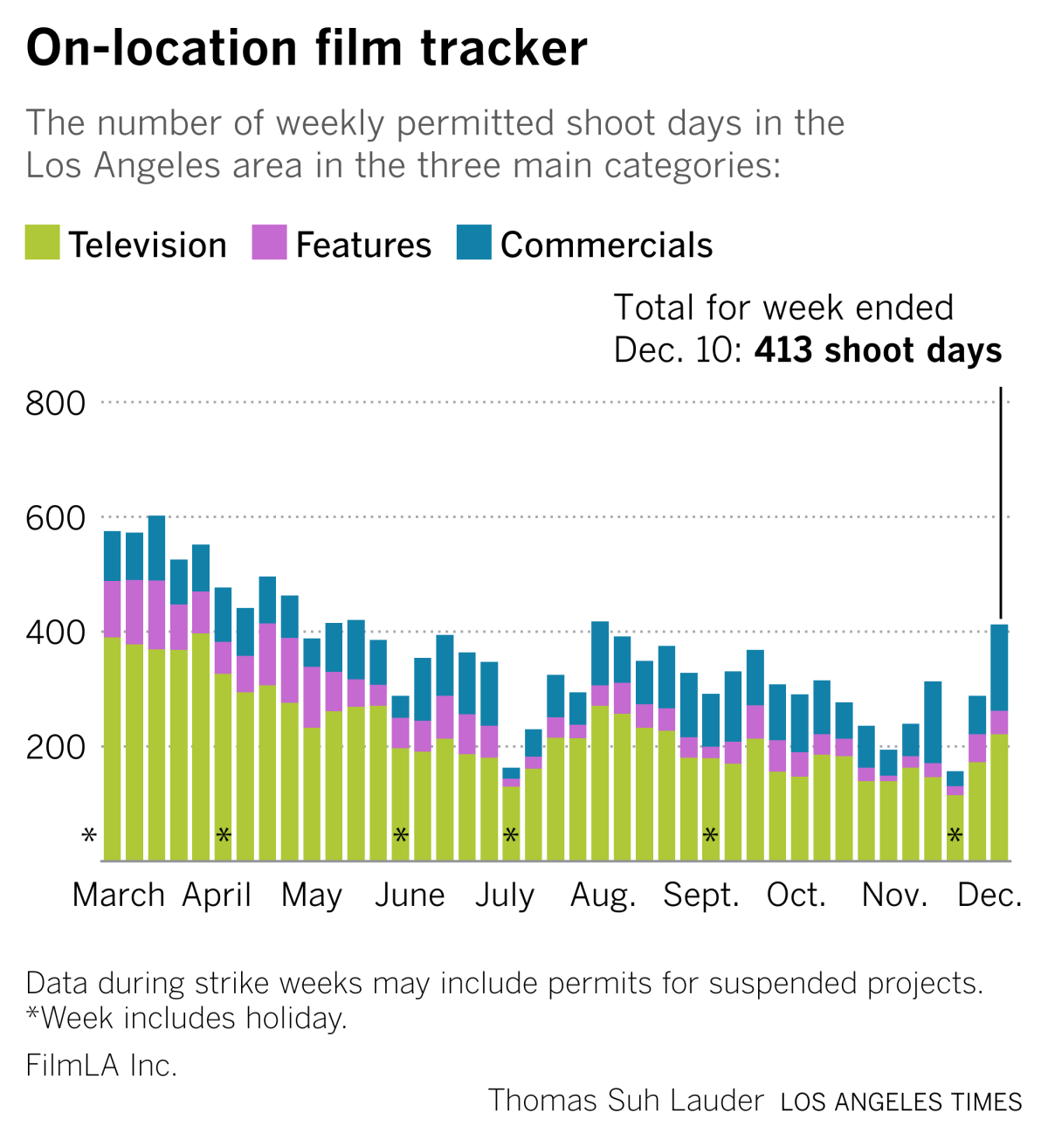How Taylor Swift, Beyoncé and Disney made ‘fun-flation’ the economic buzzword of 2023

Economic uncertainty, an unstable geopolitical climate and sticker shock at the local grocery store ($7 for a little pack of blueberries?) may have weighed heavily on the minds of consumers in 2023.
But that didn’t stop people from going out and having a ball.
Folks stretched their budgets for concert tickets, especially highly publicized megatours by Taylor Swift and Beyoncé. They flocked to sports games, got dressed up for “Barbenheimer” and emptied their wallets for vacations to Disneyland.
Look no further than the booming live music industry.
Swift’s Eras Tour grossed a record-smashing $1.04 billion in ticket sales from 60 shows this year, according to Pollstar, with some people spending more than $1,000 on a single pass. The data firm estimated that Swift’s sales in 2024 would take the tour’s total past $2 billion. Movies based on both Eras and Beyoncé’s Renaissance tour scored strong box office as well.
Total grosses for the top 100 tours worldwide surged 46% to $9.17 billion, compared with last year’s tally of $6.28 billion, Pollstar said last week. Actual attendance was up about 18%, meaning much of the revenue increase was driven by higher prices. On average, concertgoers shelled out $130.81 a pop for a concert pass, up 23% from last year.
On secondary markets, the prices are even higher. The average resale ticket cost is currently $230, according to ticketing firm SeatGeek, compared with $194 at the same time last year.
Economists have called this phenomenon “fun-flation,” and it was one of the defining features of consumer behavior during a spectacularly weird year.
With the venue reopenings after the shutdowns sparked by the COVID-19 pandemic, people often prioritized spending their discretionary income on experiences they couldn’t have during lockdown. And that demand drove prices skyward.
Prices for sporting events leaped 25% in October, compared with the same month a year earlier, according to Bureau of Labor Statistics data cited by CNBC. During that period of time, consumer prices more broadly rose a modest 3.2%. Also in October, Disneyland prices increased, with single day passes going up as much as $15 (the lowest-tier one-day, one-park ticket price remained unchanged at $104).
Experts cite numerous factors that explain this trend.
Some have attributed it to “revenge spending” after shows, live sports and restaurants were largely off limits for many Americans and COVID-19 protocols such as mask requirements made going out less enjoyable.
Sanjay Sharma, who teaches at USC’s Marshall School of Business and has experience in the media and entertainment sector, cited a psychological need among consumers for a “balm,” a soothing distraction from international conflicts, economic stress (including higher interest rates) and divisive domestic politics.
Add to that the fact that buying physical goods has become a ho-hum exercise for so many people. If you want a new headset, cashmere scarf or anything, really, you could have it on your doorstep in a couple days, if not by this afternoon, thanks to Amazon and other ecommerce companies that provide rapid low-cost shipping.
Sharma described his experience of looking at a major newspaper’s list of suggested Christmas gift ideas and thinking, “I’ve got all this stuff, and everyone I know has all this stuff.”
At a time when “stuff” feels like it’s all becoming more digital, ephemeral and immediately available, experiences have remained unique and even feel more so these days. Sharma calls it “memorable fun,” those one-of-a-kind moments like a first concert or trip to Disney that people remember for years. With practically all the music in the world available on YouTube and streaming, of course a live concert will feel more valuable.
Sharma compares this dynamic to the difference between commuter cars and collectibles, or genuine works of art versus dime-a-dozen prints from Amazon or Target.
“Experiences are becoming more and more expensive because they are scarce, and affluent folks are driving up the price,” Sharma said. “What do you want? Another pair of headphones? Another kind of tchotchke or something like that? That has lost value. But experiences are rare, and that is why the prices are going up.”
Economic disparities drive prices, Sharma said. For well-off empty nesters, young professionals and recent graduates entering high-earning careers, spending $500 on a concert ticket might not be such a big deal. In fact for many people, these experiences are status symbols, as much as, or more so than, the latest iPhone, which everyone in their social circle has.
For middle-class and lower-middle-class families, those price tags can be a big ask. But some experiences are not repeatable, and that, plus the “fear of missing out” (FOMO), means that plenty of people will hold their noses and pay up anyway.
“Prices have become inelastic, because Taylor Swift can fit 50,000, 60,000, 70,000 people into a stadium, and that’s it,” Sharma said. “So if you want in, you have to pay for it.”
There are consequences of shows and sports games becoming more expensive. Making them a luxury activity by definition puts them out of reach for many consumers. People who used to go to concerts all the time might go less often. That, of course, hasn’t hurt Live Nation’s stock, which is up more than 25% so far this year.
Not all at-home entertainment has been devalued by Netflix and Amazon, though. 4K Ultra HD disc editions of Christopher Nolan’s “Oppenheimer” reportedly sold out in their first week of release, leaving the studio scrambling to replenish store shelves in time for the holidays. Now how’s that for supply and demand?
You’re reading the Wide Shot
Ryan Faughnder delivers the latest news, analysis and insights on everything from streaming wars to production — and what it all means for the future.
You may occasionally receive promotional content from the Los Angeles Times.
Stuff we wrote
Ousted Fox News host Tucker Carlson is launching a streaming service. Tucker Carlson, who was pulled off the air by Fox News in April, is offering commentary and programs for $9 a month on his website. Fox has not commented on Carlson’s new venture.
Into the metal-verse: Why Avenged Sevenfold is doing virtual reality concerts. A partnership between the Huntington Beach rockers and the virtual reality startup AmazeVR casts light on how new technologies are shaking up the music industry.
After ‘The Marvels’ flop, questions mount for Disney over MCU’s future. “The Marvels” fell out of the top 10 at the box office after three weekends. The studio has been struggling with quality control, according to some.
Disney adds Hulu hub to Disney+ ahead of full integration. Walt Disney Co. has added Hulu shows to Disney+ for bundled subscribers. Disney CEO Bob Iger has touted this move as a “one-app experience” to draw and retain subscribers.
The docket:
- Terrence Howard accuses CAA of cheating him out of higher pay on ‘Empire’
- Disney settles with former Marvel artist’s estate over Spider-Man, Doctor Strange rights
- A fourth woman, who was a minor at the time, accuses Sean ‘Diddy’ Combs of sexual assault
Numbers of the week

How big of a hit did the job market take from the writers’ and actors’ strikes?
The Greater Los Angeles area’s entertainment industry suffered a 17% decrease in employment since the Writers Guild of America went on strike in May, according to a study by Otis College of Art and Design in conjunction with Westwood Economics and Planning Associates.
But the downturn wasn’t just because of the strikes, The Times’ Christi Carras wrote. More than 25% of entertainment jobs were cut between August 2022 and October 2023, the study estimated.
“Based on this larger downward trend, the study concludes that the fallout from the era of Peak TV may be impacting the job market more than the labor actions,” Carras wrote.

Hayao Miyazaki’s “The Boy and the Heron” took the No. 1 spot at U.S.-Canada box office with $12.8 million over the weekend, making it the first original anime film ever to top the domestic chart. It also marks the acclaimed filmmaker’s biggest opening ever in North America.
Joining the beloved animator in the top three was another Japanese film, Toho’s “Godzilla Minus One,” which collected $8.3 million in its second weekend, representing a powerful hold with a drop of just 27%. Meanwhile, Toho made waves again in Hollywood over the weekend by purchasing a 25% stake in “Severance” production company Fifth Season (previously known as Endeavor Content) for $225 million.
Film shoots
Production is starting to come back in Los Angeles after the strikes, according to the latest FilmLA data.

Best of the web
— Points to this headline for taking me on ride: In Hollywood, It’s the Golden Age of the Creepy Woman. (Wall Street Journal)
— Inside the last porn theater in Los Angeles. The last adult film theater in Los Angeles is run by a Salvadoran immigrant and former battlefield nurse. Patrons call the Tiki Theater “a refuge.” (Los Angeles Times)
— Ava DuVernay couldn’t get “Origin” funded the regular way, so she got charitable foundations to pay for it. (Washington Post)
Finally ...
Justin Chang’s always interesting best movies of the year list is out. So is raconteur filmmaker John Waters’. I have a lot of catching up to do. In music, the Times gave SZA its designation of best album.
The Wide Shot is going to Sundance!
We’re sending daily dispatches from Park City throughout the festival’s first weekend. Sign up here for all things Sundance, plus a regular diet of news, analysis and insights on the business of Hollywood, from streaming wars to production.
You may occasionally receive promotional content from the Los Angeles Times.




